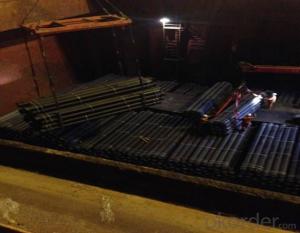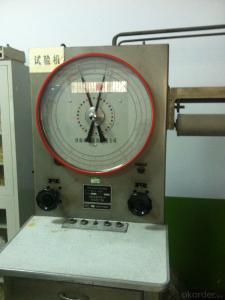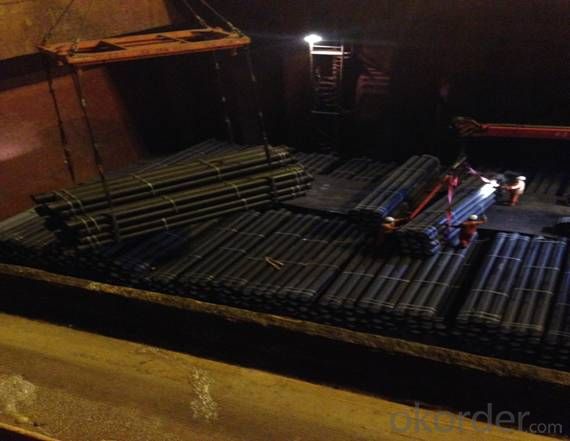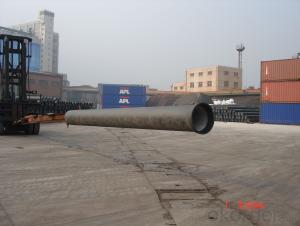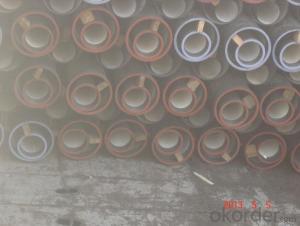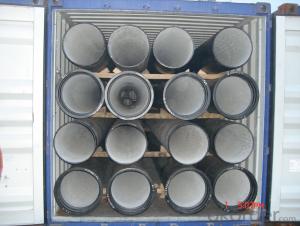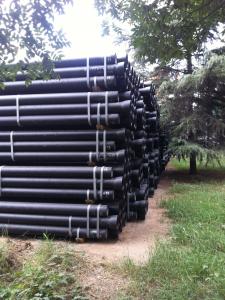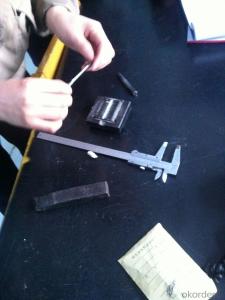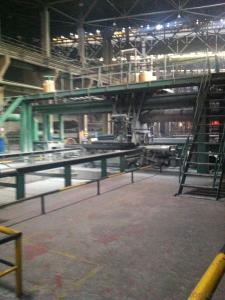DUCTILE IRON PIPE AND PIPE FITTINGS K8 CLASS DN200
- Loading Port:
- Tianjin
- Payment Terms:
- TT OR LC
- Min Order Qty:
- 23 pc
- Supply Capability:
- 3000 pc/month
OKorder Service Pledge
OKorder Financial Service
You Might Also Like
Material : Ductile Cast Iron
Size Range : DN 80mm to DN 2000mm
Unit Effective Length : 6m or 5.7m
Manufacture Standard: ISO 2531:1998/ EN 545:2006/EN 598:2007
Annual capacity : 200,000 tons
Coating Exterior: Zinc 130g/m2 according to ISO 8179-1 and bitumen coating 70 microns.
Cement Interior: Portland Cement/ High Alumina Cement/ Sulphate Resisting Cement Lining according to ISO 4179
Special requirements on external coating and internal lining can be applied
We also provide accessories such as SBR/EPDM rubber gaskets, lubricant paste, pipe caps, PE sleeves, etc.
Additional Parts:
Each pipe is strictly inspected according to related standard to ensure permanently high performance.
Easy Installation at site and service free for life
Long Service Lifespan
Quotation will arrive you within 24hours once we get your inquiry.
We guarantee offering you a competitive price.
A copy of original inspection reports of pipes will be offered after shipment.
Photos of loading process will be sent to the customer after shipment effect.
We will follow-up the delivery progress after shipment effect and update to the customer on weekly basis.
- Q: How do ductile iron pipes handle pressure surges in pumping stations?
- Ductile iron pipes are specifically designed to handle pressure surges in pumping stations effectively. The inherent strength and flexibility of ductile iron make it well-suited to withstand the sudden increase in pressure that can occur during pump start-up or shutdown. One of the key features of ductile iron pipes is their ability to absorb and dissipate energy. When a pressure surge occurs, the ductile iron pipes have the capacity to absorb the excess pressure and distribute it evenly throughout the pipe network. This helps to minimize the impact of the surge and prevent any potential damage to the pipes or the pumping station. Additionally, ductile iron pipes have a high resistance to impact and stress, which further enhances their ability to handle pressure surges. The pipes are manufactured using a unique process that imparts strength and durability, allowing them to withstand the forces exerted during pressure fluctuations without any significant deformation or failure. Furthermore, ductile iron pipes have a smooth internal surface, which reduces friction and turbulence within the pipe network. This smooth flow characteristic helps to mitigate the effects of pressure surges by allowing the water to move efficiently without creating additional stress on the pipes. In summary, ductile iron pipes are specifically engineered to handle pressure surges in pumping stations by absorbing and dissipating the excess pressure, withstanding the impact and stress, and promoting smooth flow. Their robustness and reliability make them an ideal choice for applications where pressure fluctuations are common, ensuring the longevity and efficiency of the pumping infrastructure.
- Q: How does ductile iron pipe perform in areas with high soil contamination?
- Ductile iron pipe performs exceptionally well in areas with high soil contamination due to its inherent strength, durability, and corrosion resistance properties. The material used in manufacturing ductile iron pipes is highly resistant to chemical attack, making it suitable for handling various types of contaminated soils, including those with high levels of acids, alkalis, and other corrosive substances. The corrosion resistance of ductile iron pipes is primarily attributed to their protective internal and external linings, which are designed to prevent contact between the pipe material and the surrounding soil or fluids. These linings act as a barrier, preventing the penetration of corrosive elements and reducing the risk of pipe degradation or failure. Additionally, ductile iron pipes can be further protected by applying external coatings or cathodic protection systems, which enhance their resistance to soil contamination and extend their service life. In areas with high soil contamination, ductile iron pipes offer significant advantages over other materials such as steel or concrete. Their high strength allows them to withstand the external loads imposed by the contaminated soil, reducing the risk of structural failure or deformation. Moreover, the inherent flexibility of ductile iron allows it to absorb ground movements or settlement without compromising its integrity, making it a reliable choice for areas prone to soil instability or shifting. Furthermore, ductile iron pipes have a smooth internal surface, which minimizes friction and helps maintain efficient flow rates even in the presence of contaminants. This characteristic is particularly important in areas with high soil contamination, where debris or sedimentation can accumulate and hinder fluid flow. The smooth bore of ductile iron pipes reduces the risk of clogging and ensures the continuous and reliable conveyance of fluids, even in challenging soil conditions. Overall, ductile iron pipe is a highly suitable choice for areas with high soil contamination. Its excellent corrosion resistance, strength, flexibility, and smooth internal surface make it a reliable and durable solution for conveying fluids in these challenging environments.
- Q: How does ductile iron pipe handle traffic loads and vibrations?
- Due to its inherent strength and durability, ductile iron pipe is capable of effectively handling traffic loads and vibrations. The material properties of ductile iron, such as its high tensile strength and impact resistance, make it a dependable option for enduring heavy loads and vibrations caused by traffic. When exposed to traffic loads, ductile iron pipe has the capacity to distribute weight efficiently, minimizing stress concentrations and potential damage. Its flexible nature enables it to absorb and dissipate the forces exerted by traffic, preventing the formation of cracks or fractures. Furthermore, ductile iron pipe possesses the advantage of dampening vibrations. With its high density and stiffness, it can absorb and dissipate the energy generated by vibrations, lessening their impact on the pipe and surrounding infrastructure. This is especially crucial in areas with heavy traffic or construction activities, where vibrations are common. Moreover, ductile iron pipes are frequently designed and manufactured to meet industry standards and specifications, ensuring their ability to withstand expected traffic loads and vibrations. These pipes are commonly used in water distribution systems, sewers, and underground infrastructure, where they are subjected to various dynamic loads and vibrations. In conclusion, ductile iron pipe is an exceptional choice for managing traffic loads and vibrations due to its strength, flexibility, and capacity to dampen vibrations. Its consistent performance under these conditions makes it a preferred material for infrastructure projects, guaranteeing long-term durability and minimal impact on the pipe's structural integrity.
- Q: What are the advantages of cast iron pipes?
- Ductile iron pipe is under high water pressure, can resist the external load change and adapt to the geological conditions, the pipe has the advantages of high strength, good toughness, corrosion resistance, convenient installation, flexible interface, strong shock resistance, low labor intensity, can be applied to the poor geological location and across the road, without additional processing pipe, and then with strong corrosion resistance, and can be applied to coastal saline alkali area. At present, it is widely used in underground pipeline project. Large pipe installation project can reflect the advantages of convenient installation and low labor intensity.
- Q: Can ductile iron pipes be used for underground storage tanks?
- Ductile iron pipes can indeed be used for underground storage tanks in certain situations. Ductile iron is a strong and durable material that is resistant to corrosion, making it suitable for underground applications. However, there are a few factors to consider before using ductile iron pipes for underground storage tanks. Firstly, it is important to assess the specific requirements and regulations of the project. Different regions and industries may have specific guidelines for the materials used in underground storage tanks. It is crucial to ensure that ductile iron pipes comply with these regulations and meet the necessary standards for underground storage. Secondly, the size and capacity of the storage tank should be considered. Ductile iron pipes are available in a variety of sizes, but they may not be suitable for large-scale storage tanks due to limitations in their dimensions. It is important to consult with engineers or experts to determine the appropriate pipe size and capacity for the specific storage requirements. Lastly, the design and installation of the underground storage tank should be carefully planned. Proper sealing and protection against external factors such as soil movements, water pressure, or other potential hazards should be considered. Adequate measures should be taken to prevent leaks or damage to the pipes, ensuring the safety and longevity of the storage tank. In conclusion, ductile iron pipes can be used for underground storage tanks, but it is essential to consider the specific requirements, regulations, sizing limitations, and proper design and installation. Consulting with professionals in the field and adhering to industry standards will ensure the successful use of ductile iron pipes for underground storage tanks.
- Q: Can ductile iron pipes be used in sewage treatment plants?
- Indeed, sewage treatment plants can utilize ductile iron pipes. Given their durability, strength, and resistance to corrosion, ductile iron pipes are frequently employed in sewage systems. They exhibit exceptional resilience against the challenging circumstances commonly encountered in sewage treatment plants, including corrosive wastewater and high-pressure environments. Moreover, ductile iron pipes boast remarkable crack resistance and offer long-term reliability, rendering them an ideal option for sewage treatment plants where a dependable and efficient sewage system is of utmost importance.
- Q: What are the different joint types available for ductile iron pipes?
- The different joint types available for ductile iron pipes include push-on joint, mechanical joint, flanged joint, restrained joint, and grooved joint.
- Q: Which is good for water polo cast iron pipe steel pipe?
- The advantage of ductile iron pipe is cheap, corrosion resistance, lack of toughness is poor, not easy to process
- Q: What does ductile iron pipe "ND200" mean?
- Generally speaking, the diameter of the pipe can be divided into outer diameter, inner diameter and nominal diameter. The pipe is a seamless steel pipe pipe diameter by the letter D to represent, then additional outer diameter size and thickness, such as diameter of seamless steel pipe 108, a wall thickness of 5MM, denoted by D108*5, is also used outside said, such as De63 plastic pipe, such as reinforced concrete pipe, cast iron pipe, galvanized steel pipe, said the DN, in the design drawings is generally used to represent the nominal diameter, nominal diameter is a standard in order to design and manufacture and maintenance convenient set artificially, with nominal diameter, tube (or pipe) specification name.
- Q: Do ductile iron pipes have inner enamel?
- If the market supply is indeed difficult, can be done by the owners, Design Institute of supplier relationship; if the design institute requires it to provide products can persist in wilfully and arbitrarily, the available information (if the market can not supply, design a hair ah).
Send your message to us
DUCTILE IRON PIPE AND PIPE FITTINGS K8 CLASS DN200
- Loading Port:
- Tianjin
- Payment Terms:
- TT OR LC
- Min Order Qty:
- 23 pc
- Supply Capability:
- 3000 pc/month
OKorder Service Pledge
OKorder Financial Service
Similar products
Hot products
Hot Searches
Related keywords
